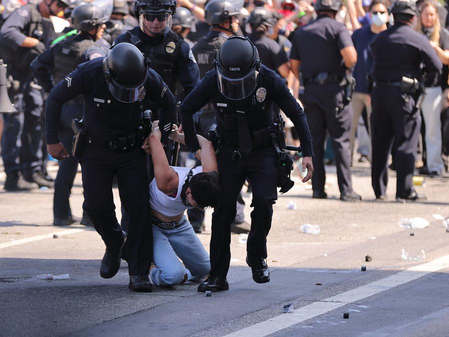
New York – Protests against the Trump administration’s immigration enforcement actions have intensified and expanded well beyond Los Angeles, erupting in at least two dozen cities across the United States, according to U.S. media reports.
In Los Angeles, demonstrators temporarily blocked traffic on the 101 Freeway. In Chicago, thousands marched through key parts of the downtown Loop, halting traffic and prompting police helicopters to circle overhead. A Chicago Transit Authority (CTA) bus was seen covered in anti-police and anti-ICE (Immigration and Customs Enforcement) graffiti, though no immediate arrests were reported, according to the Chicago Tribune.
New York City witnessed similar unrest, with crowds marching from Lower Manhattan near the federal immigration office. In Atlanta, around 1,000 people lined Buford Highway, with several hundred advancing into Doraville, leading to a tense standoff with local police.
Protests also broke out in San Francisco, Seattle, Houston, Dallas, San Antonio, and Washington, D.C., with varying levels of police presence and tension. NBC News reported multiple arrests in New York and San Francisco, while demonstrations in Houston and San Antonio remained largely peaceful.
In Austin, local police issued alerts to motorists, cautioning them about large pedestrian groups rallying in solidarity with Los Angeles protesters.
These demonstrations come amid escalating legal and political conflict in California over the federal government’s use of military forces for immigration enforcement. During a speech at Fort Bragg commemorating the 250th anniversary of the U.S. Army, President Donald Trump described the Los Angeles protesters as "animals" and a "foreign enemy," framing the demonstrations as an “invasion.” He defended deploying approximately 4,000 National Guard troops and 700 Marines to Los Angeles and threatened to invoke the Insurrection Act. He further warned that any disruption of an upcoming military parade in Washington, D.C., would be met with “very big force.”
In response, California Governor Gavin Newsom filed an emergency lawsuit in federal court seeking to block the deployment, calling it unconstitutional under the Posse Comitatus Act and the Tenth Amendment. He argued that the move violates state sovereignty and exceeds federal authority.
Los Angeles Mayor Karen Bass supported the legal challenge and imposed a curfew from 8 p.m. to 6 a.m. in the downtown area, warning that violators would be arrested.
According to the Pentagon, the deployment—focused on securing federal buildings and supporting ICE operations—is expected to last 60 days and cost approximately $134 million. Troops were dispatched within hours of the initial protests, which included highway blockades and property damage in central L.A., as reported by Xinhua News Agency.
The growing confrontation has sparked a nationwide debate about the militarisation of law enforcement and the boundaries of federal power. With protests continuing to spread, a federal judge in California has scheduled a hearing for Thursday to consider the state’s request to halt the military deployment.
With inputs from IANS